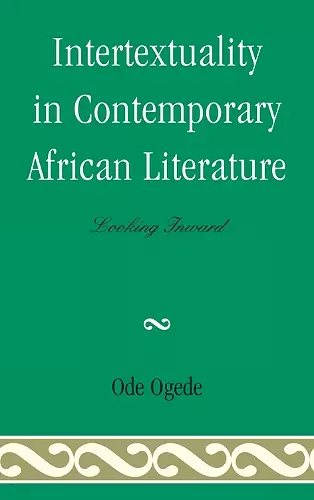Intertextuality in Contemporary African Literature
Looking Inward
Format:Hardback
Publisher:Lexington Books
Published:18th Aug '11
Currently unavailable, and unfortunately no date known when it will be back

Intellectual exchange among African creative writers is the subject of this highly innovative and wide-ranging look at several forms of intertextuality on the continent. Focusing on the issue of the availability of old canonical texts of African literature as a creative resource, this study throws light on how African authors adapt, reinterpret, and redeploy existing texts in the formulation of new ones. Contemporary African writers are taking advantage of and extending the resources available in the existing native literary tradition. But the field of inter-ethnic/trans-national African literary inter-textual studies is a novel one in itself as the theme of African writers' debt to Euro-American authors has been the critical commonplace in African literature. Detailing the echoes and reverberations the voices of the past have generated, and the distinctive uses to which the writers are putting one another's works, the book demonstrates that the influence of local stock is significant: it is pervasive and widespread, and manifests itself in ways both random and systematic, but it is a ubiquitous presence in the African literary imagination.
Dr. Ogede's elegantly written book applauds intertextuality as a resourceful creative principle and a rewarding critical enterprise, and authoritatively applies its paradigm to his reading of contemporary African letters, thus proving his thesis that African writers deliberately re-write and revise one another's work as a strategy to frame a new brand of textual originality. His exciting study discusses writers that have made a breakthrough by writing back to established canons: Nigerian author, Flora Nwapa, answering back to Cyprian Ekwensi's Jagua Nana in her novel, One Is Enough; the Ghanaian writer, Ayi Kwei Armah, to Chinua Achebe's A Man of the People in his first novel, The Beautyful Ones Are Not Yet Born; and the South African writer, Bessie Head, offering her novel, Maru, as a revisionist version of Achebe's No Longer at Ease (even if unconsciously), while younger Nigerian poets, such as Chimalum Nwankwo and Okinba Launko, could hardly rid their creative minds of the haunting ghost of the celebrated Nigerian poet, Christopher Okigbo. Dr. Ogede offers intertextual creativity as a way forward for the prospective writer, now that African writing seems to have burnt out its energy in the interrogation of the West and the exploration of race. An eminently enthralling piece of scholarship. -- Obi Maduakor, Tyndale University College
Ogede (North Carolina Central Univ.) revisits ideas he explored in previous books on Chinua Achebe and Ayi Kwei Armah--Achebe and the Politics of Representation (2001); Ayi Kwei Armah, Radical Iconoclast (CH, Jul'01, 38-6007)--and extends them by pairing these writers and others in order to study different kinds of literary influence. Though the relatively brief chapter on the thematic and stylistic affinities between Achebe's No Longer at Ease and Bessie Head's Maru is somewhat strained, chapters on Flora Nwapa's recasting of Cyprian Ekwensi's Jagua Nana in One Is Enough and on Okinba Launko's and Chimalum Nwankwo's appropriations of Christopher Okigbo's Labyrinths offer informed close readings, as Ogede brings to bear a formidable knowledge of the social, political, and historical forces at work during the periods in which these texts were written....With the emergence of so many young African writers who are consciously acknowledging their debts to their literary forebears, this book is a timely reminder of an ongoing pan-African literary dialogue. Summing Up: Recommended. Lower-division undergraduates through faculty. * CHOICE *
Ode Ogede challenges the persistent belief that most African writers look exclusively to European literature for stylistic and narrative models. He demonstrates that African writers are avid readers and imitators of other African writers. Following Ogede’s argument and detailed examples, we are able to see African writing as a dialogue among African writers crossing regional, ethnic, gender, and linguistic divides…. Looking Inward is in fact a forward-looking study through which Ogede has pointed out a significant new direction for African literary history and criticism. * Project Muse *
Ode Ogede’s Intertextuality in Contemporary African Literature: Looking Inward has recuperated the term intertextuality from its two decades of disuse in a detailed discussion of the intra-continental duologue's among major African writers. .. The book is a significant study of disjunctions and continuities among African artists. . . Ogede succeeds in showcasing the diversity of African literature and relocating it from what he considers regionalism. . . [He] reads individual works with great sensitivity and attention to detail. . . [H]e does a superb job in offering the main novels under study granular critical attention. His approach is trans-disciplinary and deeply comparative, sometimes drawing on medieval studies and Elizabethan theatre to offer a fresh perspective on modern African cultural expression. Another major strength of the book is that it draws on some African scholarship and debates generated in African institutions, something rare in African literary studies in the West, where critics often cite only a coterie of colleagues in privileged institutions. He uses accessible language, a refreshing change from fashionable critical jargon. Ogede further includes writers who have not been canonized even in African critical circles. In a field in which discussions are limited to a clique of African writers published in Western venues, it is refreshing to read a sustained analysis of works by Launko and Nwankwo, which have rarely been studied. * ARIEL: A Review Of International English Literature *
ISBN: 9780739164464
Dimensions: 240mm x 165mm x 21mm
Weight: 526g
248 pages